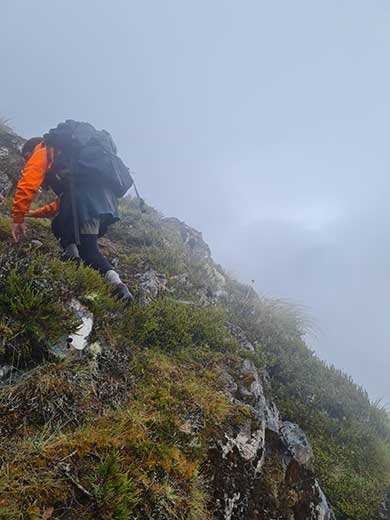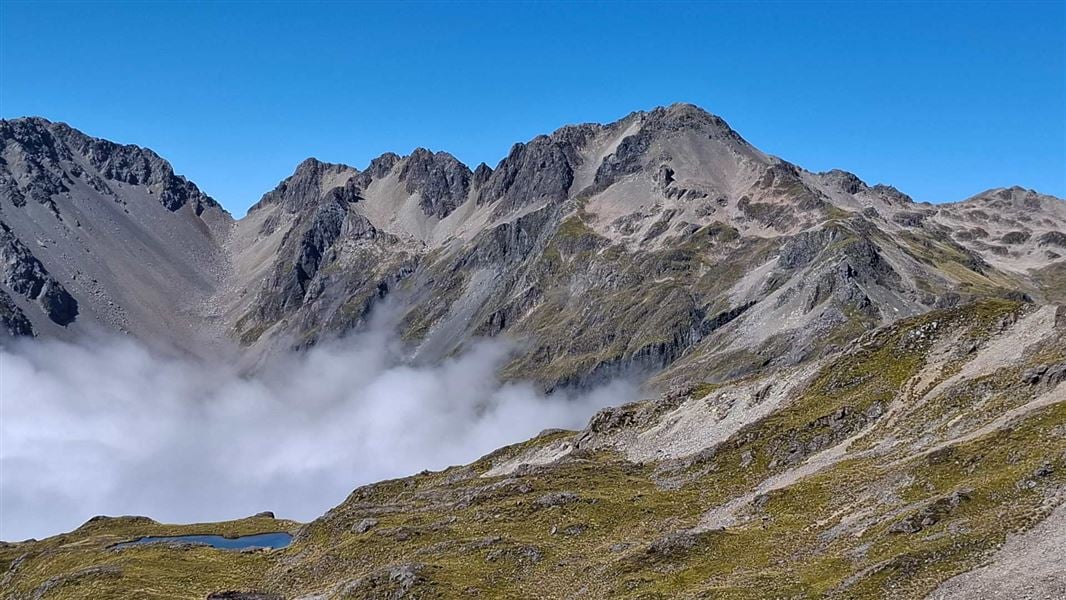Date: 17 January 2025
Two well-equipped and experienced DOC rangers and a hut warden were in the right place at the right time to help a hiker who got into trouble near Maniniaro/Mt. Angelus in the Nelson Lakes National Park.
The rescue is a reminder of the importance of always carrying equipment and a PLB when in the backcountry, even for short trips after reaching the hut.
The rangers were camping in the area while carrying out kea monitoring work when they heard someone calling for help at about 9 pm on Tuesday night, just after heavy fog rolled into the area with a southerly change. They tried to find where the calls were coming from, moving carefully in the bad weather.
After about two hours, realising the person calling hadn’t moved location during that time and fearing they were injured, the rangers set off a Personal Locator Beacon (PLB) and reached DOC staff via radio so Police could be alerted.
At the same time, a hiker staying in Angelus Hut saw an empty bunk and recalled passing a woman on the north ridge of Maniniaro/Mt. Angelus, so alerted the hut warden.
The rangers, hut warden, and the hiker who alerted the warden carried out a coordinated search until about 1 am, but weren’t moving far because of the fog. The poor conditions forced the search to pause until first light.

Ricki Mitchell moving carefully through the fog during the Maniniaro Mt. Angelus rescue on Wednesday morning
Image: DOC
Early on Wednesday morning, the four people searching resumed the coordinated search in the fog. After a few hours, they found the hiker on the edge of some bluffs below the north ridge of Maniniaro/Mt. Angelus but couldn’t get to her.
The hiker was not hurt but was cold and wet, as she had left most of her tramping gear at Angelus Hut.
In the meantime, two LandSAR Teams assembled but could not fly in by helicopter due to the weather conditions, so were preparing to travel across Lake Rotoiti by boat and then head in on foot.
The rangers tried a different route and made their way carefully down to the hiker’s position. They warmed her up and walked her back up to the ridge and down to Angelus Hut. The weather conditions remained poor throughout the day and with the steep terrain, the recovery took until mid-afternoon.
The SAR teams were stood down just before being deployed as it became clear the two rangers had the situation in hand.
After a night in Angelus Hut, the rangers and the hiker walked out together on Thursday.
Ricki Mitchell, one of the rangers involved, says they were determined to find the hiker and it was an amazing moment to get her back.
“The lesson to be learned is if you’re going out, even for a short trip from the hut, tell someone your intentions and make sure you’re carrying good equipment, including a PLB and headtorch, at all times. The conditions just change up there so quickly.
“Having the right gear and technology like GPS made a real difference, knowing we had everything we needed to be safe. When you’re up there traversing scree and navigating drop-offs and can only see a few metres, it’s pretty intense.
“We were lucky it worked out the way it did, given the horrendous weather. If she had to stay out another night, there was a real risk of hypothermia.”
She says the rescue was a team effort, with everyone involved working closely together and communicating well.
DOC’s Nelson Lakes Operations Manager John Wotherspoon says the hiker was in challenging terrain, and it was fortunate there were competent and experienced DOC field staff in the area who could safely get to the woman to rescue her without putting themselves at undue risk.
“Nelson Lakes National Park has alpine conditions right from the carpark and the weather can change quickly, so its crucial hikers check weather forecasts and carry warm waterproof clothes, food, headtorches and a PLB at all times.”
Anyone heading into the backcountry is reminded to follow the Land Safety Code, which has five simple rules to help keep people safe:
- Choose the right trip for you.
- Understand the weather.
- Pack warm clothes and extra food.
- Share your plans and take ways to get help.
- Take care of yourself and each other.
More information on the Land Safety Code.
Contact
For media enquiries contact:
Email: media@doc.govt.nz
